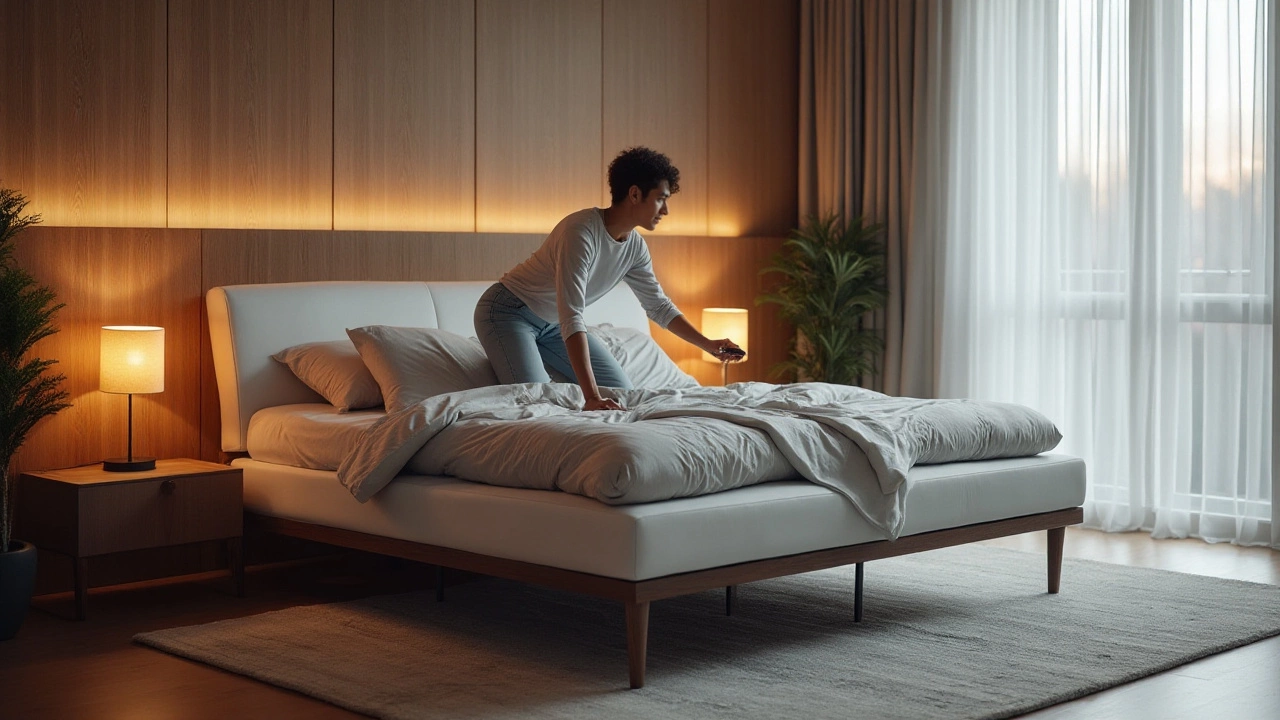Adjustable beds have moved beyond being a staple in hospitals to becoming a sought-after addition in modern bedrooms. But what do healthcare professionals think about them in terms of health advantages? This article delves into expert opinions on adjustable beds, shedding light on their role in promoting better sleep health and comfort.
Healthcare specialists often have specific insights into how these beds can aid various conditions, from snoring to chronic back pain. Let's uncover the potential health benefits they offer and what you should consider before making the investment.
- Understanding Adjustable Beds
- The Medical Perspective
- Health Benefits and Recommendations
- Factors to Consider Before Buying
- Myths About Adjustable Beds
- Tips for Selecting the Right Model
Understanding Adjustable Beds
The world of adjustable beds often seems like an innovation born out of necessity, particularly noted in hospital settings where patient comfort and specific medical needs are paramount. However, these beds have crossed the boundary into personal use, captivating those who seek more than just a conventional sleep arrangement. An adjustable bed is one in which the base can be electronically maneuvered into different angles, offering unique ergonomic benefits. This capability is crucial for providing personalized support and comfort, making it easier for people to read, watch television, or simply find the perfect position to drift into sleep.
Historically, the ability to adjust a bed to suit one's needs can be traced back to the early hospital beds in the 1900s. Now, with technological advancements, these beds boast more sophisticated features, such as massage functions, preset memory positions, and even under-bed lighting. Not merely a luxury, adjustable beds are now seen as a viable option for those with conditions such as acid reflux, sleep apnea, or chronic pain, significantly enhancing sleep quality. While traditional flat beds often come with issues like pressure points, adjustable beds provide alleviation and improved blood flow by allowing users to elevate their legs or upper body.
Including an adjustable bed in your home not only offers potential health advantages but also elevates the art of leisure. According to a recent study, people with adjustable beds reported fewer incidences of discomfort and restlessness during the night. Medical professionals increasingly advocate for these beds in managing conditions involving respiratory function and spinal alignment. The customization they offer means you can tailor your sleep environment more closely to your personal preferences, reducing the strain on sensitive areas of the body. Enhancements in design and user experience continue to make them an appealing choice for many households.
The increasing awareness and acknowledgment by healthcare providers underline the importance of sleep health in overall wellness. For instance, Dr. Linda, a renowned sleep specialist, notes that,
"The ability to adjust your sleeping position can significantly impact your health, particularly for those who suffer from back pain or poor circulation."Such endorsements highlight the potential transformative impact that an adjustable bed can have on one's nightly rest. In conclusion, whether motivated by a medical necessity or simple desire for comfort, adjustable beds represent a modern solution for improved sleep health.
The Medical Perspective
When it comes to the practical health applications of adjustable beds, doctors frequently highlight their adaptability and potential therapeutic effects. These beds are popular in clinical settings because of the customization they offer in terms of positioning, which can be life-changing for individuals suffering from conditions like back pain, muscle tension, and circulation issues. For instance, the ability to elevate or recline certain sections of the bed can significantly reduce stress on the spine, promoting better posture during rest. This can be especially useful for patients dealing with chronic pain conditions, as altering the pressure on various parts of the body can help alleviate discomfort while encouraging a restful night's sleep.
Medical experts often discuss the benefits of adjustable beds in managing specific health challenges. People suffering from gastroesophageal reflux disease (GERD) can experience relief when their bed is slightly elevated. This helps to prevent stomach acids from rising during the night, a common occurrence when lying flat. In another impactful scenario, those with sleep apnea may benefit from an adjustable bed's ability to keep the torso and head elevated, reducing airway blockages and the severity of sleep apnea episodes. Dr. Stephen Schachter explains, "For patients with certain sleep disorders, having the option to adjust elevation is invaluable, promoting not just comfort but also a significant level of safety and health improvement."
The versatility of adjustable beds is particularly highlighted in their ability to support leg elevation. For patients prone to edema or swelling in the legs, elevating the lower extremities while resting can improve blood flow and reduce inflammation. The benefits of enhanced circulation are often underscored by healthcare practitioners, as proper blood flow is essential for preventing deep vein thrombosis in bedridden individuals. Researchers suggest that the simple act of adjusting the bed’s angle can have a profound influence on vascular health, potentially lowering the risk of blood clots. Additionally, adjustable beds offer tailored support that can ease the burden on caregivers as repositioning a patient becomes much more manageable.
In regard to mental well-being, adjustable beds offer psychological comfort, as they provide individuals with a sense of control over their environment. Patients recovering from surgeries or those with mobility challenges find solace in the autonomy these beds offer. The ability to adjust one's position can help maintain independence and dignity, contributing to faster recovery times and increased satisfaction. On a practical note, the seamless movement of sections in these beds can minimize the need for manual bed adjustments, preventing strain on healthcare providers and family members assisting long-term patients.
Moreover, some adjustable bed models are integrated with additional features, such as massage functions and preset position settings, designed to enhance relaxation and relieve tension. Although not medically necessary, these features can provide a holistic approach to rest that combines both medical and lifestyle enhancements. It is this blending of medical necessity with additional comfort that makes adjustable beds an attractive recommendation by doctors for those needing support beyond a conventional mattress.
Ultimately, the insights shared by medical professionals paint adjustable beds as not just a modern luxury but as a practical aid in improving both physical and psychological health. Their customizable nature addresses a spectrum of medical concerns while providing comfort, making them a valuable tool in both medical facilities and home settings.

Health Benefits and Recommendations
The allure of adjustable beds has grown significantly, transcending their initial association with medical environments to become a preferred choice for home bedrooms. These beds are valued not only for their ability to enhance comfort, but also for their potential health benefits. Doctors have noticed several improvements in patients who use adjustable beds, particularly regarding sleep-related issues and certain medical conditions. For instance, users report enhanced **sleep health**, improved circulation, and reduced back pain. By elevating the upper or lower body, these beds help alleviate snoring and acid reflux, offering a better night’s rest.
The ability to adjust the bed's position provides much-needed support for the spine, which is beneficial for those suffering from chronic back pain. When you can customize the bed's inclination, it helps in distributing body weight evenly, reducing pressure points, and thereby minimising pain and discomfort. Moreover, this flexibility is beneficial for individuals with specific conditions such as arthritis, sleep apnea, or edema. The inclined positions have been found to aid in reducing swelling and pressure on joints, offering respite from discomfort. This supportive environment encourages a more restful and deeper sleep, which is crucial for mental and physical recovery.
According to Dr. Melisa Byrne from the Sleep Wellness Centre, "Adjustable beds are not just a luxury item; they are increasingly recommended for their therapeutic benefits, particularly in improving sleep quality and addressing specific health concerns."For those dealing with cardiovascular issues, the elevation feature can be particularly beneficial by improving circulation. Keeping the legs raised can help reduce swelling, which is often recommended for those diagnosed with conditions like Chronic Venous Insufficiency. Moreover, adjustable beds feature different preset positions like the zero-gravity setting, which simulates a neutral body posture discovered by NASA. This position is said to offer an ideal balance of support and comfort by aligning the spine and reducing unnecessary strain on the heart, allowing muscles to relax completely.
Considering Usability and Accessibility
Doctors often recommend considering the adjustability features in tandem with mattress support when contemplating the purchase of an adjustable bed. A right combination can amplify the benefits significantly. Mattresses need to be compatible with the adjustable base to ensure proper flexibility and support. Memory foam or latex are typically ideal choices due to their elasticity and resilience. It's also recommended to focus on beds equipped with programmable remote controls, allowing for easy customization according to personal preference and medical necessity. This convenience is particularly beneficial for the elderly and those with limited mobility.While considering an adjustable bed, it's crucial to weigh in factors like durability, warranty, and, most importantly, how the bed's features align with specific health needs and lifestyle. Consulting with healthcare professionals can offer insights tailored to individual health requirements. Making an informed decision can significantly impact one's quality of life, underscoring the importance of selecting the right bed for your needs.
Factors to Consider Before Buying
When contemplating the purchase of an adjustable bed, one must delve beyond mere aesthetics or the allure of a sleek remote-control mechanism. It is crucial to first understand personal and health needs, as these beds are not just about luxury but about enhancing your sleep health and comfort. First of all, assess the level of adjustability necessary for your specific condition. Some beds tilt only the head or the foot sections, while others might offer complex movements. Do you suffer from conditions like sleep apnea or chronic pain? If so, a model providing various customizable settings will ensure better support for your unique requirements.
Equally important is considering the size and compatibility with existing bedroom furniture. Adjustable bases are typically heavier and bulkier than standard ones. Will it fit seamlessly with your current decor, or does it necessitate an entire bedroom makeover? Besides, consider mattress compatibility. Not all mattresses are designed to flex with these beds, thus requiring a special type usually made of memory foam or latex. Evaluate the cushions available; they play a pivotal role in sustaining the longevity and comfort of the bed.
Examining the range of features is another critical step. Some beds come with added features such as massaging motors, USB ports, or even smart integrations. Although attractive, consider if these extras align with your lifestyle or are merely frivolous additions. Don’t forget to review the warranty and service agreements. How long is the coverage, and what does it include? Service often dictates maintenance quality and peace of mind, especially with such a significant investment. A
study published in the Journal of Clinical Sleep Medicinesuggests that maintaining optimal blood circulation and reducing pressure points can vastly improve sleep quality, but these benefits are only significant if the bed remains in great condition.
Price is an undeniable factor in purchasing decisions. Conduct a thorough market analysis to ensure the price you pay reflects the quality and features you receive. Additionally, consider the ease of installation and operation. Some models may require professional setup, adding to the cost. Finally, test before you invest. Visiting a showroom allows you to experience firsthand the potential comfort and support of the bed, ensuring that your choice addresses all your expectations. Making a careful decision can transform your bedroom from a place of routine rest to a haven of individualized comfort.

Myths About Adjustable Beds
Adjustable beds often spark a variety of misconceptions, often rooted in outdated notions or advertisements that don't tell the whole story. One common myth is that these beds are solely meant for the elderly or the infirm. While it's true that adjustable beds can provide significant benefits for people with health issues like arthritis or back pain, they aren't limited to just them. These versatile beds can also enhance comfort for anyone seeking a better sleeping experience, regardless of age or health condition.
Another myth asserts that owning an adjustable bed means a decrease in the aesthetic appeal of the bedroom. In reality, many models are designed with sleek lines and contemporary styles that fit seamlessly into modern home decor. This means you don't have to sacrifice design for function. There's also a misconception that these beds are overly complicated to operate and require a lot of technical know-how. However, advancements in user-friendly technology have made them as simple to adjust as using a remote control for a TV, allowing you to find your ideal sleeping position with ease.
There's also the persistent idea that adjustable beds are unnaturally expensive and beyond the budget of most households. While some high-end models can be pricey, there are numerous options on the market across a range of prices to accommodate different budgets. It's worth noting that the long-term health benefits might outweigh the initial cost, as poor sleep can lead to increased healthcare expenses.
"Investing in quality sleep could mean fewer doctor visits, and therefore, lower medical bills," notes Dr. James Morton, a well-respected sleep specialist.
Yet another myth suggests that adjustable beds can cause problems for mattresses, making them wear out faster or lose their shape. This isn't necessarily true when choosing a mattress that’s compatible with adjustable bases. Many mattress manufacturers design products specifically to work with these frames, ensuring the longevity and performance you desire. A related myth alleges that these beds are only beneficial if you sleep alone, as they might disturb a partner. In truth, many adjustable beds come with dual adjustment capabilities, allowing each side of the bed to move independently, catering to the different needs of couples sharing the bed. This feature is particularly advantageous for those who have different sleep patterns or preferences.
Tips for Selecting the Right Model
When it comes to choosing an adjustable bed that suits your needs, understanding the intricate details can make a substantial difference in both comfort and health benefits. To begin with, it's crucial to identify the primary reason for purchasing such a bed. Is it for medical reasons, a desire for improved sleep health, or simply the luxury of customizable comfort? Knowing the purpose will help focus your search on models that cater specifically to your requirements.
Consider the type of mattress that pairs with the frames of adjustable beds. Not every mattress is suitable, and it significantly impacts the bed's functionality. Ideally, mattresses made of memory foam or latex are recommended because they can bend and flex more easily. These materials are known for their durability and comfort, offering excellent support to the spine and joints when adjusted. Let’s not overlook the importance of noise levels of the motorized components. Some beds are whisper-quiet, others not so much, so it’s wise to test this aspect before making a decision. A quiet operation is especially important if you or your partner is a light sleeper.
Another aspect to evaluate is the range of adjustability. Some beds offer more sophisticated configurations than others. Higher-end models may allow you to adjust the head and foot sections independently, which can be beneficial for people who suffer from sleep apnea or acid reflux, while simpler designs might just adjust them together. Look out for preset positions like zero gravity, which can enhance circulation and reduce pressure points, allowing for a more serene resting experience. “Adjustable beds can significantly impact sleep quality, particularly when they support the right body posture,” says Dr. Emma Rhodes, a sleep clinician at the Bristol Sleep Institute.
“They are particularly beneficial for those suffering from chronic pain conditions, providing a level of comfort and relief that standard beds cannot”.
When it comes to features, keep an eye out for extra offerings like USB ports, under-bed lighting, and massaging features, which can enhance your daily experience with the bed. While these may not directly improve sleep health, they can contribute to an overall more pleasurable bedtime routine. It's essential, however, to consider your budget since these added features can increase the cost substantially. Speaking of cost, always research and compare warranties offered by different manufacturers. A comprehensive warranty can save you from unforeseen expenses as these mechanized beds come with a higher risk of technical issues over their lifespan compared to traditional beds.
Lastly, reading user reviews and expert reviews can lend insights into the real-world performance of these adjustable beds. Look for patterns in feedback relating to durability, comfort, and customer service. Take your time to visit showrooms and try various models if possible; nothing compares to firsthand experience. As choosing the right adjustable bed is a significant investment in your health and comfort, thoughtful and informed decisions will ultimately lead to better sleep experiences and health outcomes over time.

